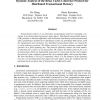Free Online Productivity Tools
i2Speak
i2Symbol
i2OCR
iTex2Img
iWeb2Print
iWeb2Shot
i2Type
iPdf2Split
iPdf2Merge
i2Bopomofo
i2Arabic
i2Style
i2Image
i2PDF
iLatex2Rtf
Sci2ools
124
click to vote
IPPS
2010
IEEE
2010
IEEE
Dynamic analysis of the relay cache-coherence protocol for distributed transactional memory
Transactional memory is an alternative programming model for managing contention in accessing shared in-memory data objects. Distributed transactional memory (TM) promises to alleviate difficulties with lock-based (distributed) synchronization and object performance bottlenecks in distributed systems. In distributed TM systems, both the management and consistency of a distributed transactional object are ensured by a cache-coherence protocol. The Relay protocol is a cache-coherence protocol that operates on a fixed spanning tree. The protocol efficiently reduces the total number of abortions for a given set of transactions. We analyze the Relay protocol for a set of transactions which are dynamically generated in a given time period, and compare the protocol's time complexity against that of an optimal offline clairvoyant algorithm. We show that Relay is O(log D)-competitive, where D is the diameter of the spanning tree, for a set of transactions that request the same object, giv...
Cache-coherence Protocol | Distributed And Parallel Computing | IPPS 2010 | Relay Protocol | Transactional Memory |
| Added | 13 Feb 2011 |
| Updated | 13 Feb 2011 |
| Type | Journal |
| Year | 2010 |
| Where | IPPS |
| Authors | Bo Zhang, Binoy Ravindran |
Comments (0)

